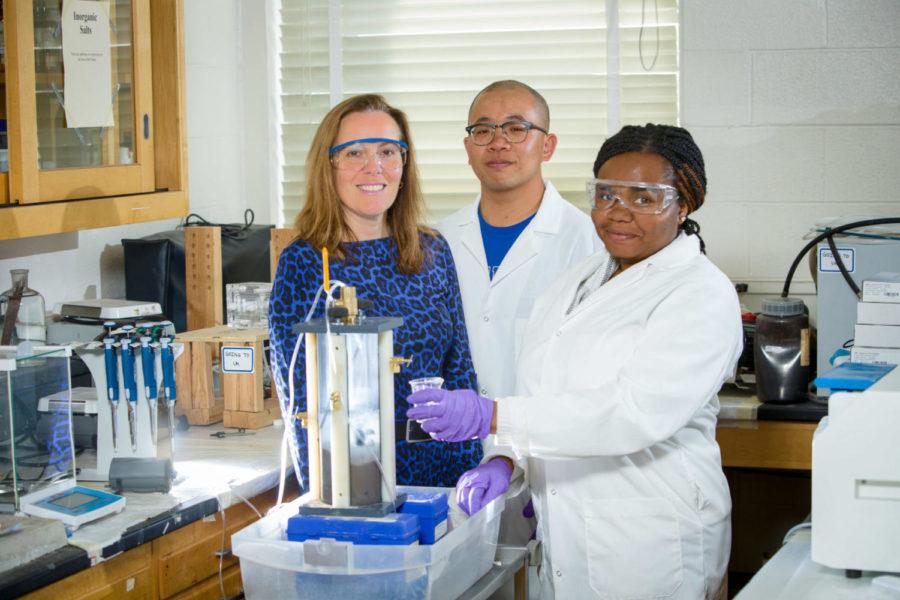‘Don’t let anybody limit you’: Brazilian STEM professor at UK honored
Dr. Isabel Escobar (left) a professor of chemical and materials engineering at UK stands with two phD candidates Joyner Eke (right) and Xiaobo Dong (center).
October 17, 2018
The Association for Women in Science has honored one of UK’s own, Dr. Isabel Escobar, in a recent membership spotlight.
AWIS is a non-profit advocacy organization that encourages social change for women in science, technology, engineering or mathematics (STEM) fields. Founded in 1971, AWIS members have encouraged progress through a variety of initiatives, from lobbying Congress to organizing conferences.
Escobar is a chemical engineering professor at UK and the chair of AWIS’s Chapters and Affiliates Committee. As chair, Escobar coordinates the functioning of 40 chapters and 30 affiliates across the United States. She has been a member of AWIS since 2008.
The AWIS spotlight coincides with Hispanic Heritage Month, which runs from Sep. 15 to Oct. 15. The month’s festivities pay tribute to the culture and heritage of Hispanics and Latinos in the U.S., like Escobar.
Escobar was born in Brazil and received her K-12 education there before moving to Florida to attend college. She said her Brazilian heritage is “everything” to her.
Escobar’s family, particularly, influenced her view of schooling.
“Latina families tend to be close,” Escobar said. “Like, incredibly close. Like, everyone is in everyone else’s business all the time, 100 percent. And my grandmother… she was this constant in my life. She wanted to know every grade, how I did, every test, it didn’t matter how small. Every homework– how did you do? If you didn’t get a 100, why not? Are you not studying hard?”
According to Escobar, her grandmother’s pursuit of education changed her outlook on academia.
“She married my grandfather, who was 27 years older than she was, when she was very young,” Escobar said. “He told her, ‘You have two choices: You can either go get yourself an education and support yourself, or, once I die– and you will be a young widow– you can find another husband. Those are your two choices.’ So, she chose education.”
Her community in Brazil also contributed to her academic drive.
“There was always this idea that was brought to us by the teachers and by the nuns [at Catholic School] and by my family that women could do anything,” Escobar said.
The belief that women can do anything also fuels AWIS’s mission.
According to the official website, AWIS aims to “[Inspire] bold leadership, research, and solutions that advance women in STEM.” The organization’s advocacy goals include encouraging women entrepreneurs, achieving workplace pay equity and emphasizing STEM education for girls.
Although many of AWIS’s initiatives focus on women in STEM, the progress the organization has embodied is not exclusive, according to Escobar.
“You cannot advocate for one group of women’s issues without advocating for all women,” Escobar said.
As both a professor and member of AWIS, Escobar hopes to advocate for all women by encouraging girls to view the sciences, and particularly engineering, as non-threatening disciplines that can and should be pursued.
“Don’t let anybody limit you,” Escobar said. “Just go for it. If you have that dream, if you have that goal, if you want to build rockets, if you want to be in the group of astronauts that would eventually go to Mars– do it.”




















































































































































